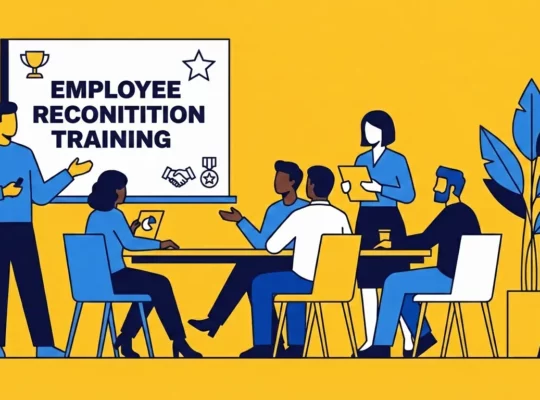Employee recognition is the key to fostering a positive workplace culture and improving employee review management. By emphasizing the importance of recognition, businesses can inspire their teams, enhance morale, and pave the way for organizational success. At Review.jobs, we understand how meaningful recognition transforms employee reviews into growth, empowering companies to recognize their employees effectively and drive success.
Table of Contents
The Importance of Recognition in the Workplace
1. Meeting Core Human Needs
Recognition fulfills a deep-seated human desire for appreciation and belonging. Employees who receive recognition feel valued and develop a stronger sense of purpose. This acknowledgment can lead to higher job satisfaction and a more engaged workforce. Research shows that recognition directly impacts retention, helping companies retain top talent and avoid high turnover rates.
2. Enhancing Employee Engagement
Frequent recognition boosts engagement by encouraging employees to go the extra mile. When employees feel appreciated for their contributions, they develop a sense of belonging, which fuels motivation and productivity. Engaged employees are more likely to contribute innovative ideas, enhancing overall organizational success.
3. Reducing Turnover Rates
A lack of recognition is a leading cause of employee turnover. Recognizing employees consistently strengthens loyalty and helps retain top talent. Businesses save on recruitment and training costs by fostering a culture where people feel appreciated and valued.
Recognition as a Strategy to Preempt Negative Feedback
1. Proactive Acknowledgment
Prevents Dissatisfaction and Negative Feedback
- Acknowledging employees’ efforts before issues arise ensures they feel appreciated, reducing potential frustrations.
- Proactive recognition, such as a manager praising an employee’s initiative during a project, fosters confidence and trust.
Builds Confidence in Leadership
- Employees are more likely to trust leaders who consistently recognize their efforts.
- This trust encourages stronger relationships and reduces the likelihood of misunderstandings.
Encourages a Growth-Oriented Mindset
- Employees who feel valued are more likely to focus on personal and professional growth, contributing positively to the organization.
2. Encouraging Positive Behaviors
Reinforces Desired Behaviors
- Recognition programs reward actions aligned with the company’s goals, such as teamwork, innovation, or customer satisfaction.
- Example: An employee who goes the extra mile to help a colleague might receive a peer-nominated “collaboration award.”
Reduces Negative Conduct
- Highlighting positive behaviors shifts focus from correcting mistakes to celebrating success, minimizing negative reviews.
Creates Role Models
Recognized employees often inspire others to emulate their behaviors, promoting a culture of continuous improvement.
3. Building Trust and Open Communication
Fosters an Environment of Trust
- Regular recognition demonstrates that leaders value their employees, creating a foundation of mutual respect.
- Employees are more likely to trust a workplace where their efforts are consistently acknowledged.
Encourages Constructive Feedback
- A recognition-rich environment makes employees more receptive to feedback, seeing it as part of their development rather than criticism.
Promotes Idea Sharing and Collaboration
- Employees in a supportive, recognition-focused culture feel safe sharing their ideas and concerns, leading to innovative solutions and improved team dynamics.
Implementing Effective Recognition Programs
1. Structured Recognition Strategies
Ensuring Fairness and Consistency
- A formal recognition framework eliminates biases and ensures all employees have equal opportunities to be acknowledged.
- Example: A points-based system where employees earn recognition for measurable achievements, such as meeting key performance indicators (KPIs).
Aligning with Organizational Culture
- Recognition strategies should reflect the company’s values and goals, ensuring that the acknowledgment reinforces the desired behaviors.
- Example: If teamwork is a core value, reward collaborative efforts through team-based awards or bonuses.
Providing Clear Guidelines for Recognition
- Employees and managers benefit from a structured system that defines what merits recognition and how it is delivered.
- This clarity reduces confusion and ensures recognition remains meaningful and impactful.
2. Leveraging Recognition Software
Streamlining Recognition Processes
- Recognition platforms simplify tracking, managing, and delivering employee acknowledgment.
- Features like real-time tracking, automated award systems, and sentiment analysis provide valuable insights into employee engagement.
Aligning with Organizational Goals
- Recognition software helps tie acknowledgment directly to business objectives, such as boosting employee productivity or enhancing customer satisfaction.
- Example: A sales recognition program that rewards employees who exceed monthly targets.
Providing Data-Driven Insights
- Advanced analytics from recognition platforms reveal trends, such as which departments receive the most recognition or where gaps exist.
- These insights enable companies to make informed adjustments to their recognition strategies.
3. Encouraging Peer-to-Peer Recognition
Building a Collaborative Culture
- Peer-to-peer recognition empowers employees to acknowledge each other’s contributions, creating a sense of camaraderie and mutual respect.
- Example: A colleague nominating a teammate for their extra effort in meeting a tight deadline.
Increasing Engagement Across Teams
- When recognition flows horizontally as well as vertically, employees feel more connected to their peers and the organization.
- Platforms that support peer recognition, such as wall posts or shout-outs, enhance employee engagement and morale.
Reinforcing Positive Behaviors
- Peer recognition highlights day-to-day contributions that might go unnoticed by managers, ensuring that every effort is appreciated.
- Example: Recognizing an employee who consistently boosts team morale with their positivity.
How Review.jobs Can Assist
Review.jobs is a certified employee review management platform designed to enhance your organization’s employee review collection and recognition approach. Here’s how it can support your efforts:
1. Managing Employee Reviews
- Centralized Dashboard: Review.jobs provides an intuitive dashboard that streamlines the review management process. Features include review moderation, reporting, labeling, and employee satisfaction metrics, allowing for efficient handling of employee reviews.
- Seamless Communication: The platform enables direct review requests from employees via email and supports anonymous review collection, fostering open and honest communication.
- Automation & Efficiency: With automatic review moderation, customizable response templates, and FAQ functionalities, Review.jobs enhances workflow efficiency, allowing HR professionals to focus on strategic initiatives.
2. Analyzing Recognition Gaps
- In-Depth Analytics: Review.jobs offers comprehensive analytics features, including keyword analysis, employee satisfaction surveys, custom surveys, and Net Promoter Score (NPS) data. These tools help in understanding employee sentiment and identifying areas where recognition may be lacking.
- Data-Driven Decisions: The platform provides detailed reports and data export capabilities, enabling organizations to identify trends, track progress, and make informed decisions to improve employee satisfaction and engagement.
- Customizable Insights: Tailor your analysis with custom reports to gain specific insights relevant to your organization’s goals, ensuring that recognition efforts are aligned with employee needs and company objectives.
3. Supporting Growth and Development
- Actionable Feedback: By transforming employee reviews into actionable insights, Review.jobs empowers organizations to develop targeted strategies that address employee concerns and promote growth.
- Enhancing Employee Satisfaction: The platform’s commitment to anonymity encourages candid feedback, providing a true understanding of employee experiences and fostering a culture of transparency and continuous improvement.
- Showcasing Positive Experiences: Review.jobs enables organizations to highlight authentic employee testimonials on company profiles, career pages, and social media channels, enhancing employer branding and attracting top talent.
Employee recognition isn’t just about acknowledgment; it’s about fostering a workplace culture that values people. By integrating recognition into your organization’s core values, you can boost morale, enhance productivity, and retain top talent. Review.jobs is here to help companies create a meaningful culture of recognition, transforming feedback into growth and ensuring organizational success.





